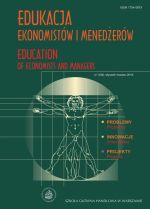Treść głównego artykułu
Abstrakt
Theme of this article is change of organizational culture functions as result exchange epoch civilization from industrial to informatics. The change of understanding integration, perception and adaptation culture functions means that main cultural function in informatics epoch isn’t reduction of uncertainty but the help to manage of uncertainty. The need of high tolerance of uncertainty cause that organizational leaders should force to developing competence of subordinates to managing of uncertainty buy special educational events. In the article to this competences counted: emotional intelligence, extended perception and skills of dialog conducting.
Słowa kluczowe
Szczegóły artykułu
Autor (Autorzy) artykułu oświadcza, że przesłane opracowanie nie narusza praw autorskich osób trzecich. Wyraża zgodę na poddanie artykułu procedurze recenzji oraz dokonanie zmian redakcyjnych. Przenosi nieodpłatnie na Oficynę Wydawniczą SGH autorskie prawa majątkowe do utworu na polach eksploatacji wymienionych w art. 50 Ustawy z dnia 4 lutego 1994 r. o prawie autorskim i prawach pokrewnych – pod warunkiem, że praca została zaakceptowana do publikacji i opublikowana.
Oficyna Wydawnicza SGH posiada autorskie prawa majątkowe do wszystkich treści czasopisma. Zamieszczenie tekstu artykuły w repozytorium, na stronie domowej autora lub na innej stronie jest dozwolone o ile nie wiąże się z pozyskiwaniem korzyści majątkowych, a tekst wyposażony będzie w informacje źródłowe (w tym również tytuł, rok, numer i adres internetowy czasopisma).
Osoby zainteresowane komercyjnym wykorzystaniem zawartości czasopisma proszone są o kontakt z Redakcją.
![]()
Referencje
-
1. Ansoff, H.I. (1985). Zarządzanie strategiczne. Warszawa: PWE.
2. Aronson, E. (1997). Człowiek istota społeczna. Warszawa: Wydawnictwo Naukowe PWN.
3. Buber, M. (1992). Ja i ty. Wybór pism filozoficznych. Warszawa: PAX
4. Burke, W.W., Goodstein, L.D. (1980). Trends and Issues in OD: Current Theory and Practice. San Diego: University Press.
5. Goleman, D. (1999). Inteligencja emocjonalna w praktyce. Poznań: Media Rodzina
6. Hall, E.T. (1984). Poza kulturą. Warszawa: PWN.
7. Hofstede, G. (2000). Kultury i organizacje. Warszawa: PWE.
8. Koźmiński, A.K. (2004). Zarządzanie w warunkach niepewności. Warszawa: Wydawnictwo Naukowe PWN.
9. Levinas, E. (2000). Inaczej niż być ponad istotą. Warszawa: Fundacja Aletheia.
10. Maslow, A. (2006). Motywacja i osobowość. Warszawa: Wydawnictwo Naukowe PWN
11. Mączyński, J. (1993). Behawioralny i kognitywny trening asertywności. In: Psychologiczne wyznaczniki sukcesu w zarządzaniu. Wrocław: Wydawnictwo Uniwersytetu Wrocławskiego, 201–228.
12. Mikuła, B. (2001). W kierunku organizacji inteligentnych. Kraków: Antykwa.
13. Morgan, G. (1997). Obrazy organizacji. Warszawa: Wydawnictwo Naukowe PWN.
14. Quinn, R.E., McGrath, M.R. (1985). The transformation of organizational culture. A competing values perspective. In: P.J. Frost, L.F. Moore, M.R. Louis et al. (eds.), Organizational Culture. London: Sage, 331 – 333, 311 – 345.
15. Senge, P.M. (1998). Piąta dyscyplina. Teoria i praktyka organizacji uczących się. Warszawa: Dom Wydawniczy ABC.
Referencje
2. Aronson, E. (1997). Człowiek istota społeczna. Warszawa: Wydawnictwo Naukowe PWN.
3. Buber, M. (1992). Ja i ty. Wybór pism filozoficznych. Warszawa: PAX
4. Burke, W.W., Goodstein, L.D. (1980). Trends and Issues in OD: Current Theory and Practice. San Diego: University Press.
5. Goleman, D. (1999). Inteligencja emocjonalna w praktyce. Poznań: Media Rodzina
6. Hall, E.T. (1984). Poza kulturą. Warszawa: PWN.
7. Hofstede, G. (2000). Kultury i organizacje. Warszawa: PWE.
8. Koźmiński, A.K. (2004). Zarządzanie w warunkach niepewności. Warszawa: Wydawnictwo Naukowe PWN.
9. Levinas, E. (2000). Inaczej niż być ponad istotą. Warszawa: Fundacja Aletheia.
10. Maslow, A. (2006). Motywacja i osobowość. Warszawa: Wydawnictwo Naukowe PWN
11. Mączyński, J. (1993). Behawioralny i kognitywny trening asertywności. In: Psychologiczne wyznaczniki sukcesu w zarządzaniu. Wrocław: Wydawnictwo Uniwersytetu Wrocławskiego, 201–228.
12. Mikuła, B. (2001). W kierunku organizacji inteligentnych. Kraków: Antykwa.
13. Morgan, G. (1997). Obrazy organizacji. Warszawa: Wydawnictwo Naukowe PWN.
14. Quinn, R.E., McGrath, M.R. (1985). The transformation of organizational culture. A competing values perspective. In: P.J. Frost, L.F. Moore, M.R. Louis et al. (eds.), Organizational Culture. London: Sage, 331 – 333, 311 – 345.
15. Senge, P.M. (1998). Piąta dyscyplina. Teoria i praktyka organizacji uczących się. Warszawa: Dom Wydawniczy ABC.
